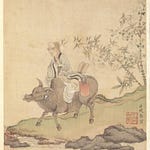Sundays with Seneca
Welcome to Sundays with Seneca on the Perennial Meditations podcast. Join the search for ancient lessons on the art of living from the writings and Stoic philosophy of Lucius Annaeus Seneca.
Today’s meditation is available to paid members. Consider becoming a paid member to gain access to our daily meditations on the art of living.
On the Happy Life
In a letter known today as On the Happy Life, Seneca wrote,
“But,” it is said, “is not the wise man happier if he has lived longer and has been distracted by no pain, than one who has always been compelled to grapple with evil fortune?” Answer me now—is he any better or more honorable? If he is not, then he is not happier either. In order to live more happily, he must live more rightly; if he cannot do that, then he cannot live more happily either. Virtue cannot be strained tighter, and therefore neither can the happy life, which depends on virtue. For virtue is so great a good that it is not affected by such insignificant assaults upon it as shortness of life, pain, and the various bodily vexations. For pleasure does not deserve that. Virtue should even glance at it.
Now what is the chief thing in virtue? It is the quality of not needing a single day beyond the present, and of not reckoning up the days that are ours; in the slightest possible moment of time, virtue completes an eternity of good. These goods seem to us incredible and transcending man’s nature; for we measure its grandeur by the standard of our own weakness, and we call our vices by the name of virtue. Furthermore, does it not seem just as incredible that any man in the midst of extreme suffering should say, “I am happy”? And yet this utterance was heard in the very factory of pleasure when Epicurus said: “Today and one other day have been the happiest of all!” although in one case he was tortured by strangury, and in the other by the incurable pain of an ulcerated stomach.
Listen to this episode with a 7-day free trial
Subscribe to Perennial Meditations to listen to this post and get 7 days of free access to the full post archives.














